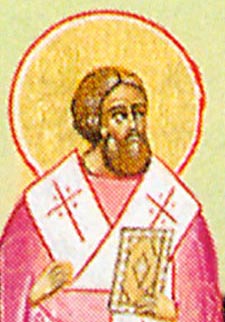|
|||
|---|---|---|---|
| This weekly bulletin insert complements the curriculum published by the Department of Christian Education of the Orthodox Church in America. This and many other Christian Education resources are available at http://dce.oca.org. | |||

Saint Paul once wrote about a deliberate personal choice he made, not to take advantage of all the rights that were due him. The reading is I Corinthians 9: 13-18. In these verses Paul writes that he has "made no use" of the rights of an apostle. In earlier verses, 4-6, he has delineated some of these rights. He asks, "Do we not have the right to our food and drink? Do we not have the right to be accompanied by a wife, as the other apostles and the brother of the Lord and Cephas? " Then in verse 7 he expands on his thought: "Who plants a vineyard without eating any of its fruit? Who tends a flock without getting some of the milk?" Paul claims his right to "reap material benefits" from those among whom he has "sown spiritual benefits" and says that God has established this right for His chosen servants, the apostles who give their lives over to preaching His word. But after making this spirited defense of the rights he's entitled to, he states that he won't claim them. Why? Because he receives his greatest reward from the knowledge that he is serving God by preaching, and doing so without imposing on his hearers the burden of providing for him. The Church remembers a saint who made a choice similar to Saint Paul's. He is the martyr bishop Alexander of Comana. He had a brilliant mind, and was so well-educated that he could discuss any area of philosophy. But his real love was for the Scriptures, which he found to be superior to any worldly philosophy. Alexander's intellectual greatness entitled him to a lofty position in the academic world. But he worried that such prominence could be a burden, obstructing his spiritual life, so he gave it up and lived as a humble coal-seller in Comana. Nobody much noticed him until the day when the bishop of Comana died. Saint Gregory of Neocaesarea presided over the council to elect a new bishop. Again and again, as the members evaluated candidates solely on their appearance or good manners, Saint Gregory cautioned them to give less emphasis to mere outward appearance and behavior. Someone jokingly called out, "Well, if appearances don't matter, let's elect Alexander the charcoal seller!" Saint Gregory, knowing how God can work even through a trivial joke, insisted on having Alexander brought in. He questioned the shy man in blackened rags, and discovered the truth of his past. Ordering him to be bathed and dressed in clean clothes, he then took Alexander before the council. Asking him a series of questions, Saint Gregory showed the members, to their astonishment, that this man could speak about Christ's teachings with great authority and grace. He was elected Bishop of Comana. o We're often told not to judge by outward appearances. Like the council members in Comana, in so doing we might miss the astonishing things that lie just below the surface. |
|||
